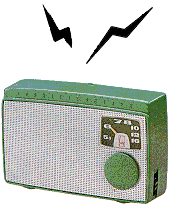I’m reading the book Free by Chris Anderson on my iPhone Kindle. It’s the only book i have on it – and i got it because it was free. It’s actually turning out to be a good read and having it on my phone allows me to read it when i normally wouldn’t read anything (subway rides, waiting in lines, etc.)
 In the book there’s a good passage about the music business and radio. In the late 1930’s, radio was emerging as a popular entertainment format but also one that made a mess of the old ways of paying musicians. At the time most radio broadcasts were live, and the musicians and composers were paid for a single performance but to musicians and composers payment for a single radio performance alone did not seem fair when that one performance was being received by millions of listeners. To them, if those millions were packed into one concert hall, the musicians share of the receipts would have been huge.
In the book there’s a good passage about the music business and radio. In the late 1930’s, radio was emerging as a popular entertainment format but also one that made a mess of the old ways of paying musicians. At the time most radio broadcasts were live, and the musicians and composers were paid for a single performance but to musicians and composers payment for a single radio performance alone did not seem fair when that one performance was being received by millions of listeners. To them, if those millions were packed into one concert hall, the musicians share of the receipts would have been huge.
Broadcasters argued that it was impossible to pay licensing fees based on how many listeners tuned in b/c no one knew what that number was. But ASCAP, which had a near-monopoly on the most popular artists, made the rules and insisted on royalties of 3 to 5 percent of a station’s gross advertising revenues in exchange for the right to play music – and it threatened to raise the rate in 1940 when the contract expired. Whoa.
Understandably, radio stations were pissed and took matters into their own hands and cut live performances entirely. Recording technology was improving and more and more stations began playing these new things called “records” instead. Music labels responded by selling records stamped with “NOT LICENSED FOR RADIO BROADCAST” but in 1940 the Supreme Court decided that radio stations could play any record they had purchased.
So ASCAP convinced its most prominent members (including Bing Crosby) to stop making recordings. Let me repeat that, ASCAP convinced artists to stop making music because of how it was being distributed. Amazing.
With a shrinking pool of music to play and a crappy deal on the table by ASCAP, the broadcasters struck out and formed their own royalty agency called Broadcast Music Incorporated (BMI) which had much better terms. At first it was a magnet for regional musicians such as R&B or Country artists who were usually neglected by New York-based ASCAP. Because these musicians wanted exposure more than money they agreed to let radio stations play their music for free – and thus business model for charging radio stations to pay a fortune for music collapsed. ASCAP never regained the right to get large royalties.
The irony is large is amazing. Worried about a bad business model, ASCAP’s bad terms practically drove free music into the radio stations. A free inferior version of music (radio) turned out to be a great marketer for the paid version.
Similarly today, free music on the web is driving more and more people to concerts. Music consumption continues to rise but record labels are collapsing. You’d think today’s issues are unique but you only have to look back 80 years to see what we continue to repeat history.